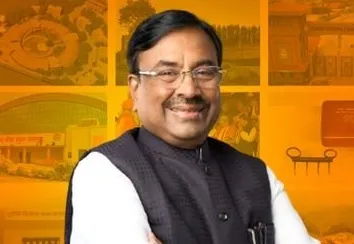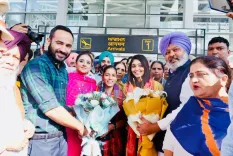Maharashtra Government Establishes Committee to Analyze Kerala's Lottery Model for Revenue Enhancement

Synopsis
Key Takeaways
- Maharashtra creates committee to study Kerala's lottery model.
- Led by Sudhir Mungantiwar, it aims to enhance lottery revenues.
- Low earnings compared to Kerala raise concerns.
- Committee to report within a month.
- Call for exploring new revenue generation strategies.
Mumbai, April 21 (NationPress) Despite governing under different ideologies, Maharashtra and Kerala share a commonality in their lottery systems.
The Mahayuti government announced the formation of a 10-member committee on Monday, led by former finance minister and senior BJP leader Sudhir Mungantiwar, aimed at examining the Kerala State Lottery to provide suggestions on how to amplify the revenue from the Maharashtra State Lottery.
This committee, which includes members from both the ruling and opposition parties, is expected to deliver its report to the state government within a month.
During the Budget Session in March, Mungantiwar raised concerns regarding the low turnover from the Maharashtra Lottery System in comparison to the Kerala lottery.
He proposed that the government could enhance earnings from the lottery system by adopting strategies similar to those in Kerala.
In the state assembly, Deputy Chief Minister and Finance Minister Ajit Pawar confirmed the establishment of the Mungantiwar-led committee to scrutinize the Kerala lottery's operational framework and revenue generation.
A formal notification regarding this committee was issued by the government on Monday.
The Maharashtra lottery system, in operation since 1969, currently offers 15 distinct lottery schemes.
However, Mungantiwar emphasized the need for an extensive review of the revenue produced by the lottery department, pointing out that the state's earnings are considerably lower than in other states.
In the fiscal year 2023-24, Maharashtra generated Rs 24.43 crore from lottery sales. Nevertheless, after accounting for prize money, GST, and other taxes, the net income amounted to merely Rs 3.52 crore.
Mungantiwar questioned why Maharashtra was not optimizing its lottery revenue, especially when states like Kerala and Sikkim are generating thousands of crores from this sector.
He criticized the regulatory inconsistencies, suggesting that if Maharashtra allows paper lotteries, other states should also permit the state's paper lotteries in their areas.
Furthermore, he argued that if Maharashtra does not offer online lottery systems, other states should not conduct online lotteries within its territory. Nevertheless, states like Kerala and Sikkim continue to sell online lotteries in Maharashtra.
“With a population of only 3 crore, Kerala has successfully generated Rs 12,529 crore, while Maharashtra, with over 11 crore residents, struggles to earn even a fraction of that. By emulating the Kerala model, Maharashtra could potentially generate around Rs 25,000 crore,” stated Mungantiwar.
He urged the government to consider various strategies for generating additional revenue instead of citing the projected revenue deficit of Rs 45,891 crore for 2025-26.
Moreover, Kerala has linked its lottery revenues to social welfare initiatives for the handicapped and economically weaker sections, ensuring that the proceeds benefit those in need. Mungantiwar called on the Maharashtra government to adopt a similar strategy.
(Sanjay Jog can be contacted at sanjay.j@ians.in)









